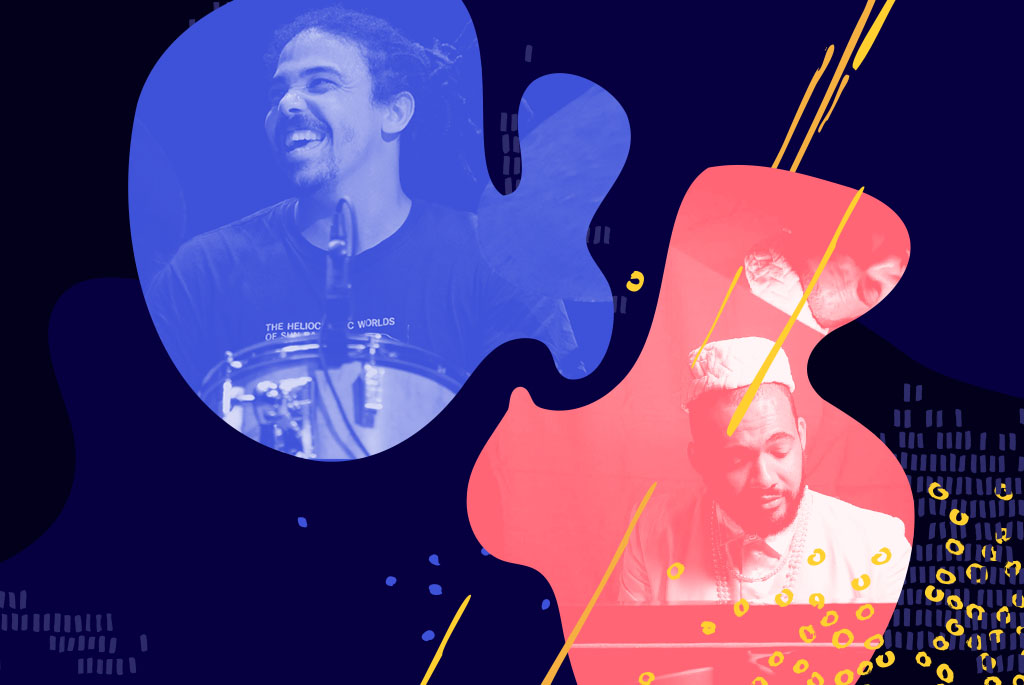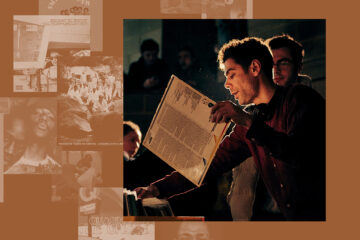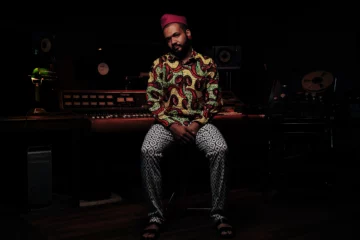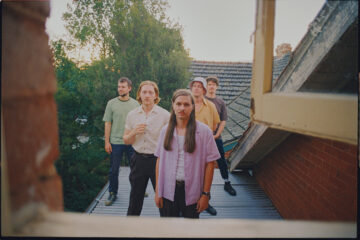Apartheid ended a week before Gabi was born. Political segregation in the Africa’s southernmost country should be consigned to history, decide two-thirds of the white citizens of South Africa. The year is 1992, two years before the first democratic elections and the inauguration of Nelson Mandela. Gabi’s parents already know their daughter will grow up in a new world. East of Pretoria, the administrative capital of South Africa, in a township that sounds like their future: Mamelodi, mother of melodies.
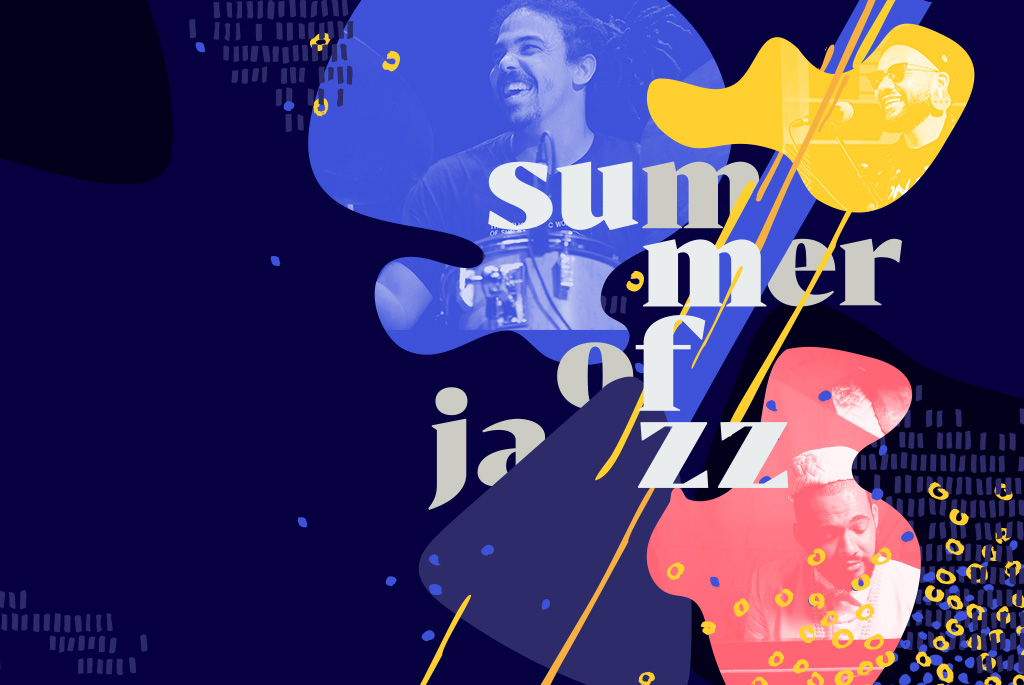
A selection on Vinyl records on the topic
Gabi Motuba is a trained jazz singer today. The 31-year-old has recorded several albums and won many an award. She has sung with iconic South African jazz artists like Tumi Mogorosi and Nhlanhla Mahlangu. Recently, she performed her own compositions accompanied by a string quartet. She is currently working for other musicians; Gabi translates traditional jazz from South Africa. She is also in residence at the Soweto Theatre, having moved from Pretoria to Johannesburg. Since then, an hour’s drive has separated her from her birthplace, one of the most densely populated and poorest areas in the region.
»I remember how we used to prepare for church on Sundays,« Gabi tells HHV. »My father would put on jazz records. They filled our house with music. At that moment, it was just like another piece of furniture .« The jazz coming out of the speakers connects with Gabi’s religion. The church is transformed into a concert. Hundreds of people sing in the choir during Sunday mass. Gabi learns choruses and melodies, the hymns and the feeling of hearing the many voices at the same time. »We experience this in the church first, before we experience it anywhere else,« she says, meaning, »This experience becomes the foundation of Black identity.«
The fact that Gabi ended up in Johannesburg has something to do with the unique music that is made there, she says. A circumstance, she says, that can be traced back to the radical thinkers who emerged historically from South Africa’s largest city. »They shaped ideas that are important to us as people today. That’s why music also carries this spirit,« she says. The way musicians in Johannesburg are able to mix influences from all over the world with their own is an incredible skill in the Johannesburg jazz scene today.
Yet jazz is not only a feature of Johannesburg. It makes conversations possible all over the country, says Gabi. Among artists. But also with one another. This is why music has such an enormous influence on social life in South Africa, she says. »Jazz seems to be the only musical discipline that actively asks people to grow, learn, explore and engage in dialogue with others,« Gabi says. The music doesn’t let you go back to the way you were before. It changes: your convictions, ideas, the individual. Gabi wants to acknowledge jazz’s political relevance in South Africa. During the colonial period, under the apartheid regime, today.
»My father used to put on jazz records. They filled our house with music. At that moment it was just like another piece of furniture.«
Gabi Motuba
»We need to constantly and critically question systems that we take for granted,« says Gabi. »This is the only way we can pursue our quest for freedom as a society and create a better life for everyone.« This process of questioning, she says, is synonymous with the fundamental characteristics of jazz. »As a musician, you question by observing and analysing. In this way you uphold the idea that conditions our striving for freedom.«
Gabi Motuba is not alone when it comes to this political approach. Young musicians who never lived under the apartheid regime search for their future identity in the past. They study at the universities of Cape Town, Pretoria or Johannesburg. Like Gabi, many wonder how they can use their artistic training to address the social issues of their generation. After all, contemporary South African jazz may no longer need to rebel against apartheid. But it still has to fight its aftermath – more than 30 years after the abolition of what was known as racial segregation.
Apparent freedom
»South Africa is struggling with its unresolved past,« says Bokani Dyer. The jazz pianist and singer recently released an album on Brownswood, the internationally acclaimed label run by radio host and DJ Gilles Peterson. His father was a well-known saxophonist who lived in exile as a South African freedom fighter. Bokani, who was born in 1986, says, »On paper, it looks like apartheid ended with the first democratic elections. But that is not the case. We are facing problems today that can be traced back to that time.«
This is why his current album »Radio Sechaba« is about the symbolic construction of a nation. People should come together, discuss, build a connection. The fact that the title of the record is based on »Radio Freedom«, one of the most important radio stations for exiles during the apartheid era, is a coincidence. »The station was in operation at a time when people needed to hear message of freedom delivered by the struggle for liberation,« says Bokani. »Radio Sechaba« is merely a continuation of that idea.
»We are facing problems today that can be traced back to that time of apartheid.
Bokani Dyer
However, because of the supposed freedom in South Africa, political issues are complicated to formulate today, he says. »At the time of apartheid, it was evident that we should fight against it and for freedom,« says Bokani. The fight is now being fought on many fronts: The country is riddled with state corruption, racist violence shapes relations with immigrants, and the cities often suffer from power cuts that last for hours.
Nevertheless, in no way does Bokani’s music sound like a funeral procession. His music gives out »good vibes« in which he wants to embed his »message«. That’s why he likes to quote the famous jazz saxophonist Wayne Shorter: »You have to play the way you envision the world.« Shorter formulated this sentence during the US civil rights movement in the 1960s. Not all young musicians in South Africa would subscribe to his topicality, but many do. If you listen to recent releases by Thandi Ntuli, Linda Sikhakhane or Thembelihle Dunjana, you will immediately recognise what Bokani is talking about. Good hope resounds not only at their cape, but from all over the country.
Overcome through upliftment
»Sometimes the biggest problems produce the best music,« says Dave Durbach. The Cape Town native runs Afrosynth, a label that re-releases South African music from the 1980s. However, he has also released two compilations of contemporary jazz under the title »New Horizon«. As DJ Okapi, he spreads the sounds at gigs all over the world. The response was enormous, he said. The strong interest in South African jazz is palpable. It can also be attributed to his work and to Afrosynth.
The political potential of jazz – whether as a soundtrack for the struggle against apartheid or the search for an identity in the shadow of the same – has not diminished over the years. At the time, political messages were packaged in musical metaphors for fear of censorship. The sounds were still cheerful nevertheless. After all, it was important not to let the music dampen the mood any further. This is similar to the situation today, even in face of the fact that South African jazz has been able to develop more freely since the mid-1990s because artists no longer have to fear interference from the authorities.
»Die Dinge haben sich nicht über Nacht geändert. Viele der damaligen Probleme bestehen auch heute noch.«
Dave Durbach
What is difficult for young jazz musicians in South Africa today, however, is to gain international recognition. Dave Durbach speaks of a »generation gap« – the older jazz generation dominates in its perceived significance, although continuity in the sound exists. The name of Abdullah Ibrahim, who composed an anthem against the apartheid regime under the name Dollar Brand, is spoken just as frequently as the names of trumpeter Hugh Masekela or world-famous singer Miriam Makeba.
That said, however, Dave Durbach does not want to divide South African jazz into »before« and »after« apartheid. »Things didn’t change overnight. Many of the problems of that time still exist today. And exceptions to the norm have always existed. During apartheid, instances of integration and cooperation between non-white and white musicians occurred. Just as there are innumerable instances of racism and extreme violence perpetrated by the state after the end of apartheid,« says the owner of Afrosynth. This is another reason why South African jazz has to be considered as a whole and over time.
Community and the present
»If you listen to the Black music that came before us,« says 34-year-old drummer Asher Gamedze, »you can hear what’s going on.« His second album, »Turbulence and Pulse«, his latest release on International Anthem, features free improvisation that is meant to »envision the past«, as he puts it. As a historian, he is interested in the significance of a piece at the time of recording. Asher mentions Max Roach’s »Tears for Johannesburg« or the music of Miriam Makeba, one of the most famous voices against the apartheid regime. »If we listen carefully,« Asher says, »we can learn something about the struggles people were going through at the time.«
This is why Asher, who came to play the drums by chance, constantly asks himself the question, »How should a piece of music feel?« Because a relationship with time only develops through feeling. It is not for nothing that he loves music that feels as if it is taking place on several temporal levels. »It about dissonance and tension,« he says. »But also about the autonomous movement of the music – and whether you’re playing against a dominant feeling in it or playing off that dominant feeling«.
This movement never expresses itself alone, but only in relation to other people. »Whether it is a band, a family or a political collective: The idea of an ensemble coming together to organise something is at the root of all movement,« says Asher. »People who want radical change in society can never do it alone. The same goes for music. Even if all you do is play your own songs, you are never alone«.
»Jazz is a friendly way of being.«
Thembelihle Dunjana
The idea of community is at the heart of contemporary South African jazz. It draws on a tradition that has enabled people to pass on their experience under difficult circumstances: the Ubuntu philosophy. It is a centuries-old concept that combines many meanings, but which emphasises human unity and evokes its harmony.
Thembelihle Dunjana, an award-winning jazz pianist from Cape Town, mentions Ubuntu in the context of her childhood. Growing up in Gugulethu, in South Africa’s Western Cape, Thembelihle experienced the spirit of jazz at an early age. »There was always music playing somewhere,« she says. »Either in people’s houses, in their cars or at regular gatherings. In addition, many family rituals were associated with music. It is an integral part of the natural flow of the processions. Even children’s games always had melodies.«
Jazz is an integral part of the culture not only of Cape Town, where it originated, but of South Africa as a whole. You don’t give it a second thought, the music is simply a »friendly way of being«, as Thembelihle says. That is also the reason why she doesn’t see herself performing only in the concert halls of the world. The leader of a fledgling quintet also regularly uploads tutorials to YouTube. Her repertoire includes the Cape Jazz of Abdullah Ibrahim and other classics of South African music history. And, like many others from her genre, builds the bridge from the past to the present.

